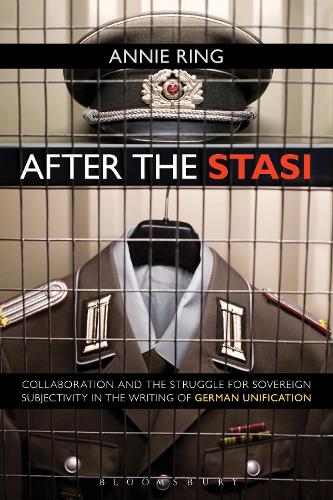
After the Stasi: Collaboration and the Struggle for Sovereign Subjectivity in the Writing of German Unification
(Hardback)
Available Formats
Publishing Details
After the Stasi: Collaboration and the Struggle for Sovereign Subjectivity in the Writing of German Unification
By (Author) Annie Ring
Bloomsbury Publishing PLC
Bloomsbury Academic
22nd October 2015
United Kingdom
Classifications
Tertiary Education
Non Fiction
830.90092
Physical Properties
Hardback
280
Width 156mm, Height 234mm
567g
Description
Why did so many citizens of the GDR agree to collaborate with the Stasi Reading works of literature since German unification in the light of previously unseen files from the archives of the Stasi, After the Stasi uncovers how writers to the present day have explored collaboration as a challenge to the sovereignty of subjectivity. Annie Ring here interweaves close analysis of literary fiction and life-writing by former Stasi spies and victims with documents from the archive, new readings from literary modernism and cultural theories of the self. In its pursuit of the strange power of the Stasi, the book introduces an archetypal character in the writing of German unification: one who is not sovereign over her or his actions, but instead is compelled by an imperative to collaborate an imperative that persists in new forms in the post-Cold War age. Rings study identifies a monumental historical shift after 1989, from a collaboration that took place in concert with others, in a manner that could be recorded in the archive, to the more isolated and ultimately less accountable complicities of the capitalist present. While considering this shift in the most recent texts by East German writers, Ring provocatively suggests that their accounts of collaboration under the Stasi, and of the less-than-sovereign subjectivity to which it attests, remain urgent for understanding the complicities to which we continue to consent in the present day.
Reviews
In addition to suturing the GDR experience of collaborative subjectivity to the ongoing present, Ring also links this literature to its earlier incarnations in the history of literary modernism. Reaching as far back as Faust, Penthesilea, and Bartleby, the Scrivener, which harken forward to the protagonists of Ich, animal triste, and Stille Zeile sechs, Ring implicitly reconstructs one tentacle of the sprawling Modernism Monster that is often overlooked by its many researchers. She achieves this most effectively by tracing some of her authors, chiefly Hensel and Hilbig, back to Kafka, that master of liminal subjectivity whose works were not always welcome and available behind the Iron Curtain. The complex of agency and vulnerability (83) shared by the work of these three authors gives needed intertextual literary nuance to a body of GDR fiction that is often otherwise read for its political and historical interest. * Seminar *
Overall, it is an excellent introduction to the difficulties faced by the authors of the GDR and their transition to a new reality. After the Stasi is a work that one would recommend to those who have more than a passing understanding of the intricacies of Germanys reunification and the contemporary literary scene in Germany. * The European Legacy *
Author Bio
Annie Ring is Lecturer in German at University College London, UK.
